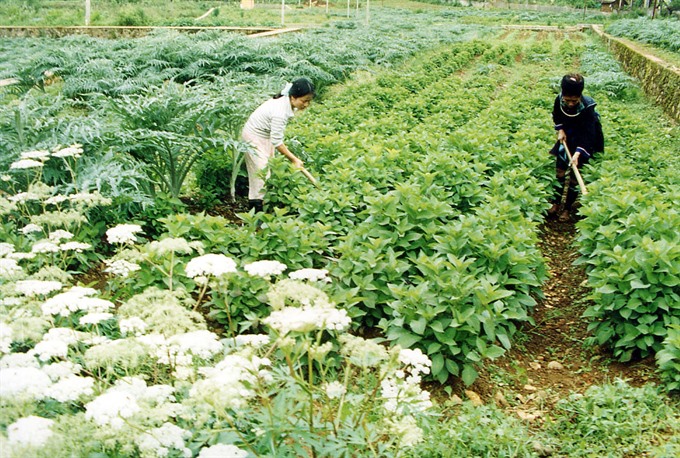 Society
Society

Due to a critical shortage of domestic supply, 80 per cent of all ingredients used in the production of Western and traditional drug production in the country are imported, said pharmacist Tạ Ngọc Dũng, Secretary General of the Việt Nam Medical Material Association.
 |
| Traditional herb garden in the frontier township of Sa Pa on the northern mountain province Sơn La. — VNA/VNS Photo Đình Huệ |
HÀ NỘI — Due to a critical shortage of domestic supply, 80 per cent of all ingredients used in the production of Western and traditional drug production in the country are imported, said pharmacist Tạ Ngọc Dũng, Secretary General of the Việt Nam Medical Material Association.
The figure was presented Wednesday at a meeting between association heads and related agencies, chaired by Prime Minister Nguyễn Xuân Phúc. The meeting was held in preparation for a national conference in April on developing medicinal herbs, which will be chaired by the Prime Minister.
The current situation is unfortunate, given the country’s ancient medical traditions and potential, Dũng said. “The quality of medicinal materials are not good enough. We just exploit the natural medicinal plants without giving due regard to maintaining and developing rare herbs,” Dũng added.
Overexploitation and deforestation may lead to a permanent loss of rare species. Without preservation efforts, traditional medicine recipes either crafted or kept by traditional doctors who are now advanced in age have little chance of survival.
The association proposed that the Government issue a national programme on developing and protecting Vietnamese herb resources, which is expected to draw the participation of interested individuals and organisations, especially investment in large-scale and high-tech production.
Former Deputy Prime Minister Nguyễn Khánh said he has been thinking for 30 years how to combine the best of traditional Eastern medicine and Western medicine, but hasn’t been successful. “The Government must shoulder much of the blame, given its lack of proper guiding directions and policies,” Khánh added.
In addition, small-scale and scattered production without overarching planning hardly does the sector any favours in an increasingly demanding market, he said.
Out of 300 medicinal plants that have passed the World Health Organisation’s Good Agriculture and Collection Practices (GACP), Việt Nam only has 18.
Việt Nam is a tropical country, with vast areas of rainforest and delta land, which is already an abundant reserve of medicinal herbs, but the reality hasn’t lived up to its potential. “For example, recently, it surfaced in the media that a Vietnamese medicine, the Gold Star unguent, can easily fetch US$6 in foreign markets, but we sold it for $0.5. That’s very unfortunate,” PM Phúc said.
Concluding the meeting, PM Phúc said he placed high hopes on the coming national conference, expecting a vision and resolutions to boost “one of the country’s potential advantage.”
PM Phúc also stressed the importance of market demand, saying it was the driving force for herb development.
“Regarding institutional issues, the Ministry of Health will need to prepare drafts with specific policies that we will hear at the coming conference,” PM said.
The PM said he expected that soon, “herbs will become a valuable commodity of the country, which will cure people, provide good incomes and improve the quality of life.” — VNS




